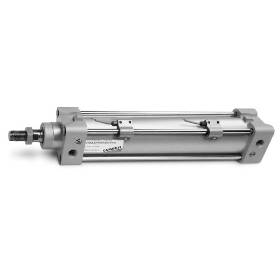
| Type of construction | with tie-rods |
| Operation | double-acting, single-acting, tandem. Low friction version: double-acting only. |
| Materials | standard = AL end-blocks, rolled stainless steel rod AISI 420B, anodized AL tube, zinc-plated steel nuts and tie-rods, PU seals; low friction = standard materials with NBR piston seal and NBR rod seal (FKM rod seal on request) |
| Type of mounting | with tie-rods, with front / rear flange, foot mounting, with centre / front / rear / swivel trunnion |
| Strokes min - max | 10 ÷ 2500 mm |
| Operating temperature | 0°C ÷ 80°C (with dry air - 20°C) |
| Operating pressure | 1 ÷ 10 bar (standard versions) 0,1 ÷ 10 bar (low friction version) |
| Speed | 10 ÷ 1000 mm/sec, no load (standard versions) 5 ÷ 1000 mm/sec, no load (low friction version) |
| Fluid | filtered air, without lubrication. For standard versions only: if lubricated air is used, it is recommended to use oil ISOVG32. Once applied the lubrication should never be interrupted. |
| 60 | M | 2 | L | 050 | A | 0200 |
60 |
SERIES |
M |
VERSIONS: M = magnetic N = non magnetic L = low friction |
2 |
OPERATION 1 = single-acting, front spring 2 = double-acting *, front and rear cushioned 3 = double-acting *, no cushion 4 = double-acting *, rear cushioned 5 = double-acting *, front cushioned 6 = double-acting *, through-rod, front and rear cushioned 7 = single-acting, through-rod * all double-acting cylinders are also available in the low friction version. |
L |
MATERIALS: L = see the GENERAL DATA table on page 1/1.20.01 T = stainless steel nuts AISI 303 - stainless steel tie-rods AISI 420B - for other materials see the GENERAL DATA table on page 1/1.20.01 |
050 |
BORE: 032 = 32 mm 040 = 40 mm 050 = 50 mm 063 = 63 mm 080 = 80 mm 100 = 100 mm 125 = 125 mm |
A |
CONSTRUCTION: A = standard with lock nut for rod RL = cylinder with rod lock F = cylinder with centre trunnion |
020 |
STROKE: see table |
= standard V = FKM rod seal N = tandem R = NBR rod seal W = all FKM seals ÷130C° L = low friction version without rod seal (rear supply only) * * The possibility to order the cylinder without piston rod seal, further reduces the friction force, |